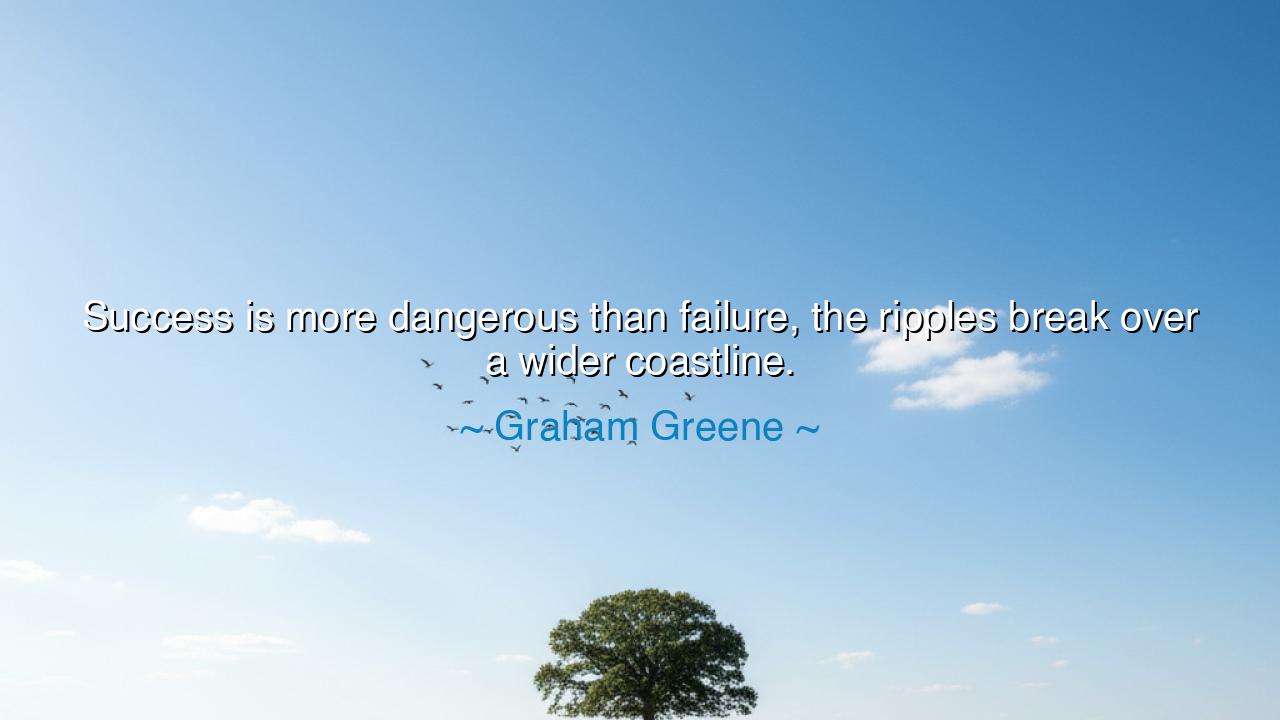
Success is more dangerous than failure, the ripples break over a






Opening Scene – Narrated by Host
The room was calm, the soft hum of the outside world barely audible. Jack sat at his desk, reflecting on a quote that had caught his attention. It was from Graham Greene, a writer known for his deep explorations of human nature. The quote, “Success is more dangerous than failure, the ripples break over a wider coastline,” stirred something in Jack. It was a reminder that success, often celebrated, can have unforeseen consequences, its effects reaching far beyond what we might expect.
Jeeny walked into the room, noticing Jack's thoughtful expression. She sat across from him, sensing that something significant had caught his attention.
Jeeny: “You look like you’re reflecting on something big. What’s on your mind?”
Jack looked up, still absorbed by the quote, and shared it with her.
Jack: “I was thinking about something Graham Greene said: ‘Success is more dangerous than failure, the ripples break over a wider coastline.’ It really struck me. Greene is saying that success, while often seen as the ultimate achievement, can have consequences that extend far beyond what we anticipate. The impact of success is often wider and more unpredictable than the impact of failure.”
Jeeny nodded, considering the depth of the quote.
Jeeny: “That’s such an interesting way to look at it. We often think of failure as the dangerous thing—the setback we need to avoid at all costs. But Greene is suggesting that success can be even more dangerous. When we succeed, the ripple effects can spread far and wide, and sometimes they bring challenges we weren’t prepared for. Success can lead to expectations, pressure, or even unintended consequences.”
Jack: “Exactly. Success can set off a chain of events that we don’t always have control over. When you fail, there’s a certain clarity—you know where you stand, you know what went wrong, and you can try again. But with success, things can quickly get out of hand. It can change how people view you, raise expectations, or even bring new responsibilities that you weren’t ready for. It can feel like the ripples of success keep expanding and you can’t stop them.”
Host: Their conversation deepened as Jack and Jeeny explored the idea that success, while often desired, can have unexpected and even overwhelming consequences. Greene’s words weren’t just about success itself—they were about the ripple effect it has on everything around us. Success is not just a personal achievement; it’s a change that touches people, systems, and expectations.
Jeeny: “It also makes me think about how we often focus on success as the end goal, the thing we all strive for. But maybe we don’t always consider the full implications of achieving success. It’s easy to think that success will bring us what we want—happiness, recognition, or freedom. But in reality, it can bring pressure, scrutiny, and expectations we never considered. The ripples of success aren’t always as easy to navigate as we think.”
Jack: “Yes, and it’s also about how success doesn’t just change us—it changes how others interact with us, too. People might have higher expectations of you, they might want more from you, or they might view you differently. Success can sometimes feel isolating because the relationship between you and the world around you changes. Failure, while difficult, doesn’t carry the same kind of long-lasting ripple effects. You can bounce back from it more easily.”
Jeeny: “That’s true. Success can put you in the spotlight in ways you don’t always expect, and the pressure to maintain that success can be exhausting. People start to expect you to always be at your best, and it can feel like you’re walking a tightrope. There’s a certain freedom in failure, in knowing that you can learn from mistakes and try again, but success doesn’t give you that same room to fail or experiment.”
Host: Jack smiled, the clarity of their conversation settling in. Greene’s words weren’t just a warning about the challenges of success—they were a reminder that success, while often celebrated, can be a double-edged sword. The wider the coastline of success, the more ripples it creates, and sometimes, those ripples can bring unexpected challenges and pressures.
Jack: “So, maybe the takeaway here is that success, while desirable, comes with its own set of complexities. It’s not always as simple as achieving what we want—it’s about managing the consequences of that success, and understanding that the ripples it creates can be as overwhelming as the failure we fear.”
Jeeny: “Exactly. It’s about balancing success with responsibility, and understanding that success doesn’t always bring the satisfaction we expect. It’s important to manage not only the achievement itself but the effects it has on our lives, our relationships, and our future.”
Climax and Reconciliation
The room felt more grounded now, as Jack and Jeeny reflected on the deeper meaning behind Greene’s words. Outside, the world continued its steady rhythm, but inside, they had uncovered something important: success, while often the goal, can bring unforeseen consequences. The ripple effects of success can be as wide and overwhelming as those of failure, and understanding that helps us navigate the complexities of achievement.
Jack: “So, maybe the key is to approach success with a clear understanding of its impact. It’s not just about achieving the goal—it’s about being prepared for the changes it brings and managing the ripples that extend beyond us.”
Jeeny: “Exactly. Success isn’t just about reaching the destination—it’s about how we handle the consequences and keep ourselves grounded as the ripples expand.”
Host: The conversation settled into a quiet understanding. Success is not just an achievement—it’s a force that creates ripples that extend far beyond us. By understanding the complexities of success, we can manage its consequences, stay grounded, and use it to create lasting and positive change.






AAdministratorAdministrator
Welcome, honored guests. Please leave a comment, we will respond soon